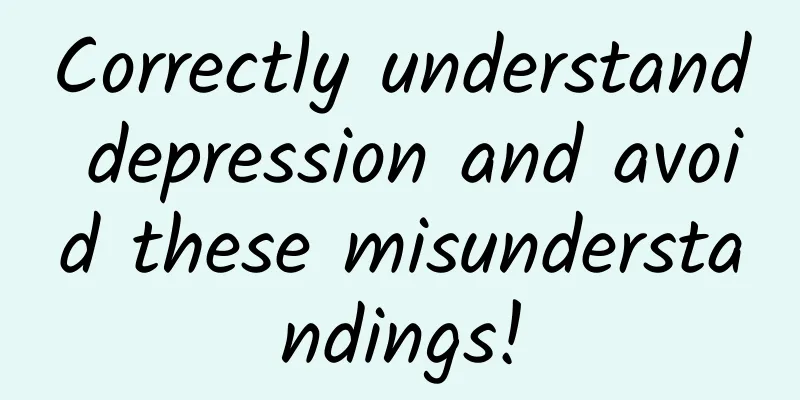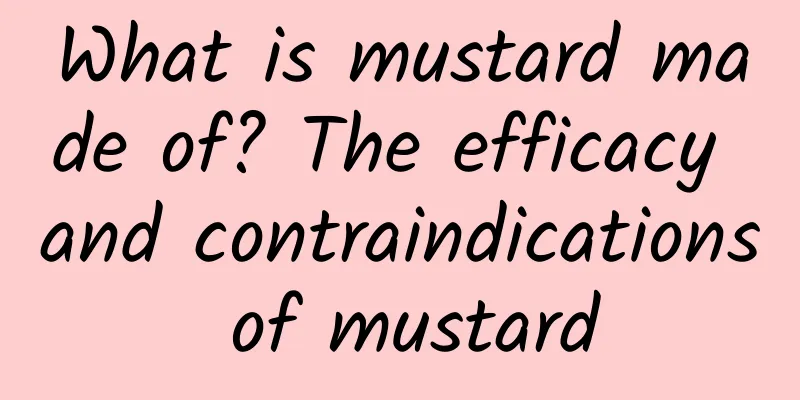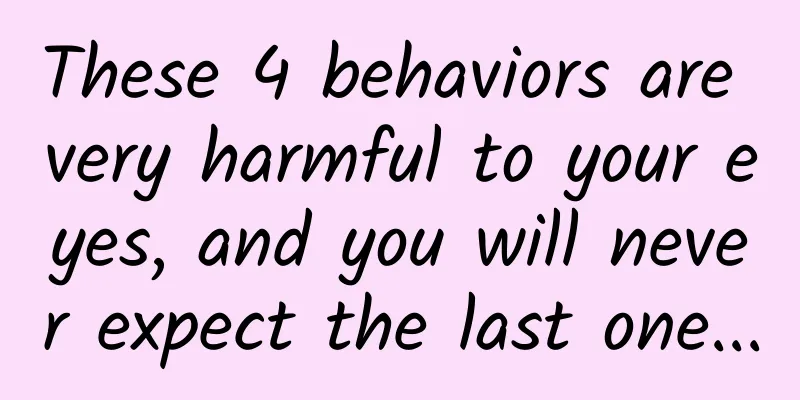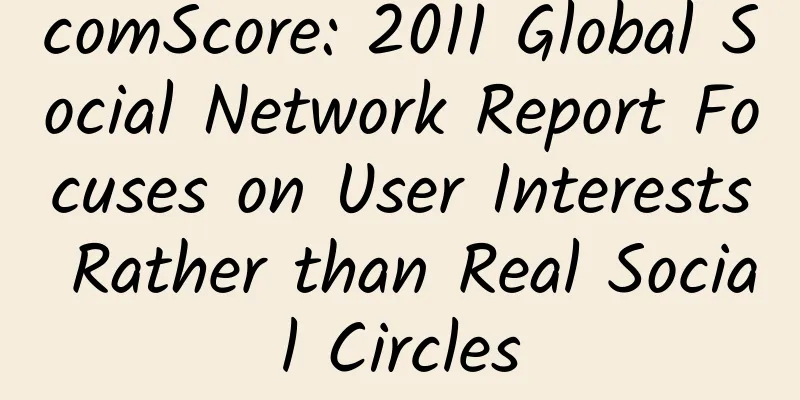Correctly understand depression and avoid these misunderstandings!

|
Screenshot from Sina Weibo According to CCTV, depression is becoming the second largest "killer" of humans after cancer, and it is estimated that 350 million people worldwide suffer from the disease. In response to the increasing number of people with depression, the National Health Commission recently issued the "Work Plan for Exploring Characteristic Services for Depression Prevention and Treatment", requiring that by 2022, the rate of depression consultations should be increased by 50% on the existing basis. However, some people believe that depression is not a disease, but a manifestation of being squeamish, hypocritical, and having poor stress resistance, and does not require treatment. Is this really the case? National Health Commission website In fact, it is this wrong concept that has prevented many patients from being discovered and treated in time. Depression is an affective disorder. It is a type of mental illness with significant and persistent low mood as the main clinical feature. It is a multidimensional disorder that includes emotional, physical and cognitive symptoms and requires medical intervention and treatment. Depression patients mainly show symptoms of depressed mood, loss of interest or enjoyment, guilt, or low self-esteem, sleep and appetite disorders, physical fatigue, difficulty concentrating, etc. Depression can be divided into mild, moderate and severe depression according to the severity. It is widely present in all kinds of people. Professionals with high work pressure and high mental tension, as well as the elderly and women in special physiological periods (postpartum, menopause), are all high-risk groups for depression. With the popularization of mental health knowledge, the public is more and more concerned about mental health, but there are still a large number of people who have misunderstandings and even prejudices about depression. Please avoid the following misunderstandings! 1. People with cheerful personalities will not suffer from depression? This is the biggest misunderstanding about depression. Being friendly and cheerful are just personality traits or habitual behavior patterns, and have no essential connection with depression. Because they love to laugh, be friendly and cheerful, their true feelings and needs are more easily ignored and difficult to be discovered, so once they take the initiative to ask for help, please give them more understanding and care. 2. Is depression the same as anxiety? "Depression" and "anxiety" are often mentioned together, but there are obvious differences between the two. Generally speaking, anxious people have higher energy than ordinary people, which is mainly manifested by nervousness, worry, overthinking, rapid heartbeat, high blood pressure, trembling hands, sweating, and restlessness; while depressed people have lower energy than ordinary people, which is mainly manifested by low mood, few ideas, unwillingness to talk, and reduced activity. If anxiety is regarded as lighter than depression, and the cause of depression is explained by excessive anxiety and worry, it is a misunderstanding. In addition, there are a very small number of patients with severe depression who cannot express themselves clearly and their speech content is illogical due to their illness. In this case, they should never be labeled as "mentally ill". This kind of depression can return to normal after a few weeks or months after treatment. 3. Are antidepressants addictive and do you have to take them for life? Antidepressants can be simply divided into traditional tricyclic drugs, monoamine oxidase inhibitors and new antidepressants such as 5-HT reuptake inhibitors such as paroxetine. Common side effects of antidepressants include gastrointestinal reactions and restlessness, but there is no addiction side effect. In addition, only severe depressive episodes and recurrent depressive episodes require long-term maintenance drug treatment. More patients with depression are recommended to receive scientific treatment under the guidance of a doctor. Antidepressant treatment can be divided into acute treatment, consolidation treatment, and maintenance treatment. Acute treatment takes 8 to 12 weeks, consolidation treatment takes 4 to 9 months, and maintenance treatment lasts 2 to 3 years depending on the patient's condition. 4. Can eating sweets help control depression? Although eating sugar can sometimes boost mood briefly, it can have a negative impact on mental health in the long run. Studies have found that eating too much sugar can make the body more susceptible to inflammation, and some hormones associated with inflammation can cause the brain to enter a depressive state. The impact of eating too much sugar on the microorganisms in the body is also one of the causes of depression, because some microorganisms "thrive" in an environment with more sugar and produce certain chemicals that make people more prone to depression. In addition, people who eat too much sugar will also produce more advanced glycation end products (AGEs), have stronger oxidative stress reactions, and are more likely to have insulin resistance and dopamine disorders, all of which are related to inflammation. It is recommended that people with depression eat less sugar and eat more foods rich in omega-3 fatty acids, which is more beneficial to mental health. Tips for preventing depression: To prevent depression, you need to adjust your mind from the root. These self-regulation methods may help↓ Sleep method: Adequate sleep can relieve fatigue and reduce the impact of bad emotions on the body. Exercise method: Exercise is one of the most effective ways to relieve bad emotions and can help the body secrete happy dopamine. Diet: Carbohydrates are a type of food that can calm emotions. They can prompt the brain to secrete a neurotransmitter that helps people calm down and relax. Suggestion method: Studies have found that among people experiencing depression, those who can actively find the positive side can get out of their emotions faster. Color method: If you are angry, stay away from red; if you are depressed, stay away from black and dark blue; if you are anxious or nervous, choose light blue. Music: Listening to music for 10 minutes can help relieve bad mood. Sometimes learning unfamiliar music is more effective. Breathing technique: When you are under stress, slow down your breathing and try to roll your tongue back. It can relieve your mood in seconds. Lighting method: Putting yourself in a bright environment can effectively counteract the influence of bad emotions. References: CCTV.com, People.cn, Science Popularization China, Health News WeChat public account, etc. Popular Science in China: Talks from Masters at the Frontier of Science and Technology China Internet Joint Rumor Refutation Platform Xinhuanet Science Department Co-production |
>>: Where do ginkgo trees grow? When do ginkgo trees bloom?
Recommend
How to treat sore throat during breastfeeding?
During the breastfeeding period, new mothers have...
How the placenta is delivered
The delivery process is not only about the safety...
Can I remove the IUD after three days of intercourse?
There are certain precautions for removing the IU...
Drink bone soup to supplement calcium? This article tells you how effective it is
Can bone soup provide calcium? The calcium in bon...
What to do if you are calcium deficient during menopause
Women will slowly enter menopause after reaching ...
Care of Cesarean Section Wounds
Many female friends are unable to give birth natu...
Why do I have breast pain after sex? That's the situation
Many women experience breast pain after sexual in...
Why does the clitoris hurt when urinating?
In fact, due to the special physiological structu...
How to improve the sound insulation effect during decoration? What methods can improve the sound insulation effect during decoration?
We all know that house decoration is a very compl...
Which department should a woman with kidney deficiency go to?
When the kidney's essence, qi, yin and yang a...
Disadvantages of eating oysters for women
Eating oysters is very helpful for male sperm act...
What should five-month pregnant women pay attention to when sleeping?
The sleeping position of pregnant women is very i...
How to install a shoe cabinet when the entrance door faces the living room?
We all know that different house types have diffe...
How to choose fresh chicken? What are the methods to make the chicken tender?
Chicken is delicious, has high nutritional value ...
Why is black tea sweet and green tea bitter? What kind of green tea tastes light
Green tea is the most produced type of tea in my ...









